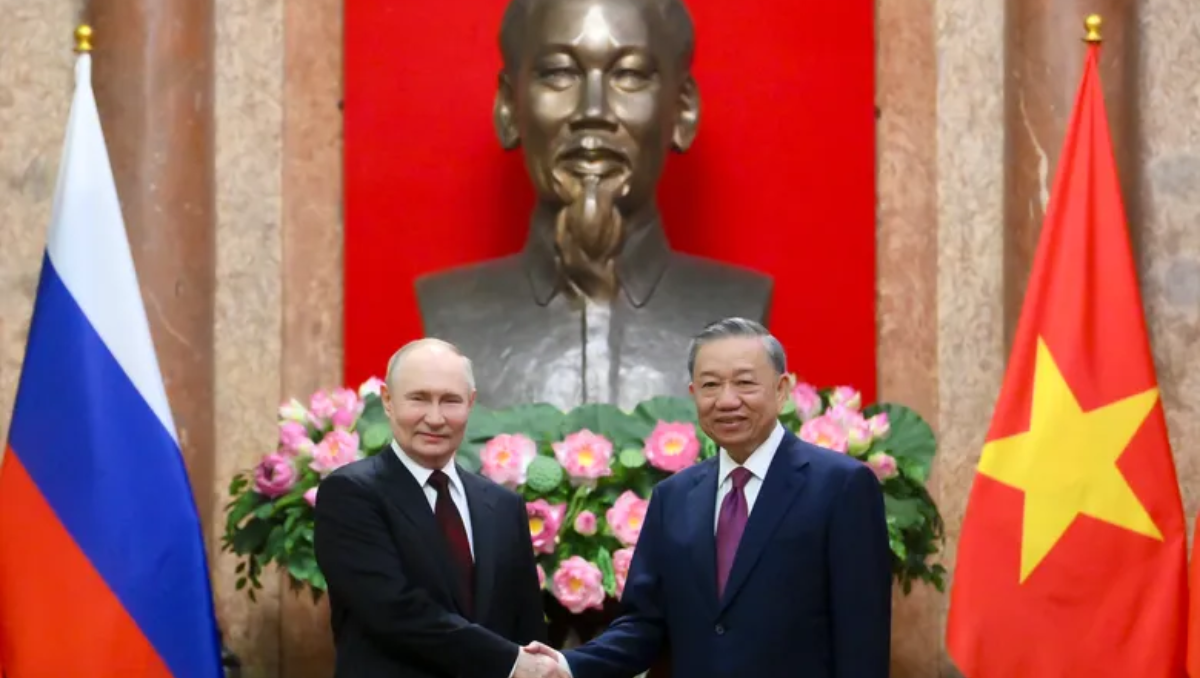During a state visit to Vietnam, Russian President Vladimir Putin concluded a number of agreements with his Vietnamese counterpart, To Lam. Moscow is trying to strengthen its Asian connections in order to offset the mounting criticism that it is receiving for its aggression in Ukraine.
After the meeting, Mr. Putin stated that the two nations were interested in “building a dependable security infrastructure” in the Asia-Pacific area, one that excluded “closed military-political blocs” and relied instead on nonviolent conflict resolution.
The two sides signed agreements to increase their collaboration in the fields of research, technology, education, health, and oil and gas development. They also decided to start drafting a plan for a Vietnamese centre for nuclear science and technology.
The implementation of energy projects and increased investments are part of the strategy to “further cooperate in the fields of defense and security in order to deal with non-traditional security challenges,” as outlined by Vietnam’s new President To Lam. Along with praising Russia’s “domestic political stability,” he congratulated Putin on being reelected.
Russia And North Korea
The agreements that Mr. Putin signed the day before with North Korean leader Kim Jong Un, promising mutual assistance in the event of an invasion, were more significant than those that Russia and Vietnam had made, according to Nigel Gould-Davies, a former British ambassador to Belarus and senior fellow for Russia and Eurasia at the International Institute for Strategic Studies in London.
Arriving early on Thursday morning, Putin had signed a pact with Kim Jong Un, the leader of North Korea, promising mutual assistance in the case of conflict. As both Moscow and Pyongyang confront intensifying standoffs with the West, they are poised to sign a strategic agreement that could represent the closest relationship between them since the end of the Cold War.
According to the official Vietnam Media Agency, Putin also met Prime Minister Pham Minh Chinh and the country’s most influential leader, Nguyen Phu Trong, the general secretary of the Communist Party. On Thursday afternoon, Mr. Putin drove to the Presidential Palace in Vietnam, where he was met by schoolchildren flying both the Vietnamese and Russian flags. He embraced and shook hands with Lam, followed by a bilateral discussion and a joint media briefing.
Russian Ambassador Gennady S. Bezdetko stated on Wednesday that his country is eager to continue “close and effective cooperation” in the areas of energy, industry, technology, education, security, and trade, as reported by Vietnamese official media. The American Embassy has strongly condemned the trip.
Since Mr. Putin’s 2017 visit to Vietnam, a lot has happened. A number of sanctions spearheaded by the US now confront Russia for its aggression in Ukraine. Putin has an arrest warrant out for war crimes issued by the International Criminal Court in The Hague in 2023. Rejecting it as “null and void,” the Kremlin emphasized that Moscow does not acknowledge the court’s authority. It’s like Putin is attempting to break the international isolation with his recent visits to China, North Korea, and now Vietnam.
Looming Concerns
The United States and its allies are increasingly concerned about possible arms deal in which Pyongyang provides Moscow with much-needed munitions for use in Ukraine in return for financial backing and technology transfers, which could exacerbate the threat posed by Kim’s nuclear weapons and missile programme. Both nations refute allegations of arms deliveries, which would be in violation of the sanctions imposed by the UN Security Council, which Russia has previously supported.
Vietnam values Russia for two reasons: first, it is the country’s largest supplier of military hardware, and second, Russian oil exploration technology supports Vietnam’s claims to sovereignty in the disputed South China Sea. Vietnam is unlikely to give Russia a sizable amount of weaponry because doing so would jeopardise the advancements the country has made in its military equipment agreements with NATO members, especially the United States, which has provided naval patrol boats and is in talks about supplying aircraft.
Since 1950, Hanoi and Moscow have maintained diplomatic ties. This year also marks the 30th anniversary of the treaty that established “friendly relations” between Vietnam and Russia. Vietnamese cities like Hanoi, where the numerous Soviet-style apartment buildings are now eclipsed by skyscrapers and a statue of Soviet Union founder Vladimir Lenin stands, are examples of this long-standing relationship and its influence. Party chairman Trong was among the many members of the Communist Party’s top leadership who attended Soviet universities.
Russia appears to have seen the visit primarily as a showpiece, as the Russian government looks to influence and interact with other nations, especially the Global South.
